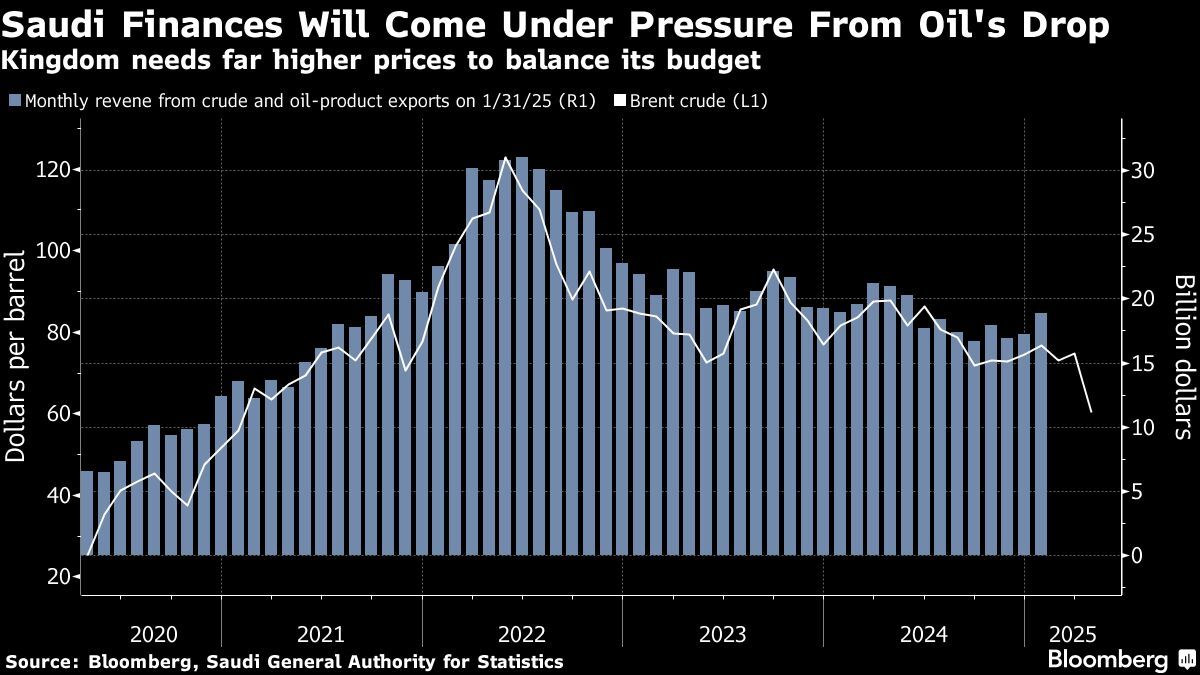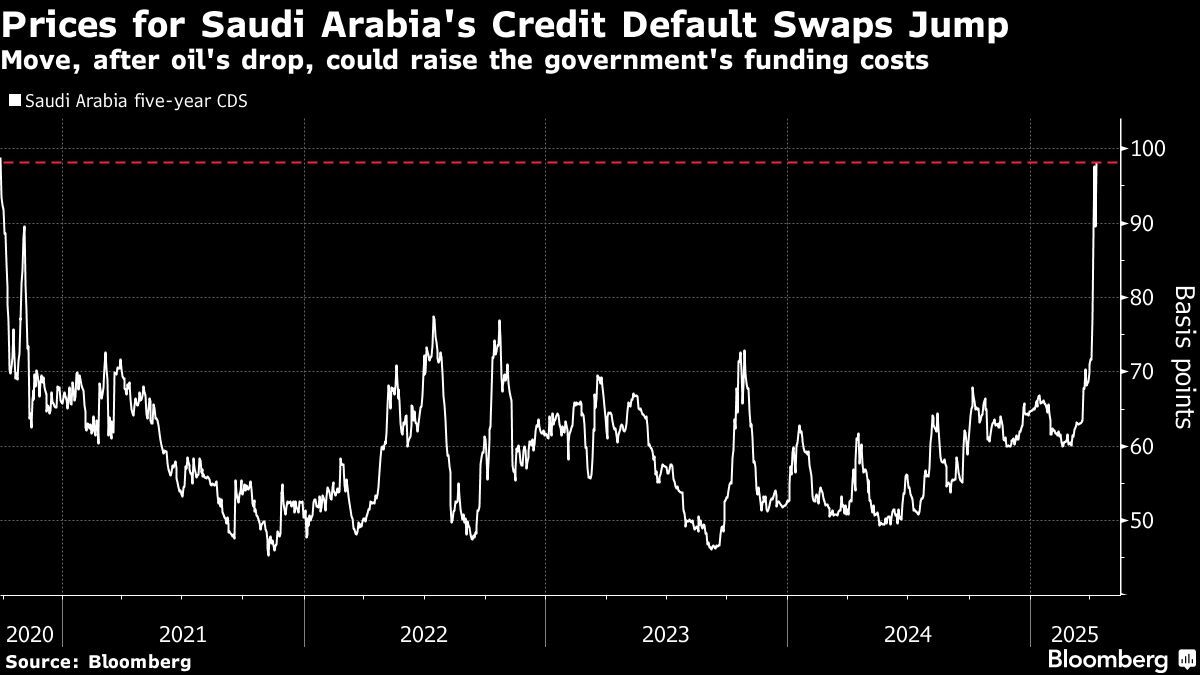
Riyadh, Saudi Arabia. The country's Ministry of Finance told Bloomberg it is assessing the recent developments and stands ready to take whatever decisions are needed to keep its fiscal position strong.
(April 10): The oil-price crash is set to have far-reaching consequences for Saudi Arabia’s finances and vast economic ambitions.
The kingdom’s budget deficit will probably soar to US$67 billion (RM299.51 billion) this year, Goldman Sachs Group Inc calculated in projections provided exclusively to Bloomberg News. That’s well over double the government’s base forecast from late 2024 and will likely force Crown Prince Mohammed bin Salman to borrow more on global bond markets and further cut back his multi-trillion-dollar plans to transform the economy.
Crude has plunged to its lowest level in about four years after US President Donald Trump unveiled new tariffs on almost all countries on April 2, raising the possibility of a global recession. Within hours of that, Opec+, an oil cartel headed by Saudi Arabia and Russia, shocked energy traders by saying it would speed up plans to raise output.
Brent crude recovered late on Wednesday after Trump said he would delay some levies, but fell again on Thursday. At US$64 a barrel, it's still down almost 15% in the past week. And many analysts predict the worst is to come.
Saudi Arabia’s Ministry of Finance told Bloomberg it is assessing the recent developments and stands ready to take whatever decisions are needed to keep its fiscal position strong.
“There’s going to have to be some fiscal adjustment,” Farouk Soussa, Goldman’s economist for the Middle East and North Africa, said in an interview. He bases his budget forecast on an average oil price this year of US$62.
“We are going to see more borrowing, and I do think there’s got to be a more aggressive re-prioritisation when it comes to the projects,” he said. “They don’t shy away from these really difficult decisions.”
Even before this month’s rout, oil was too low for the kingdom to balance its budget. The government needed prices to be as high as US$93 last year to achieve that, and US$108 if the sovereign wealth fund’s spending on the crown prince’s megaprojects was included, according to Ziad Daoud, the chief emerging markets economist at Bloomberg Economics.
In recent months, the Saudi government delayed some spending. The Finance Ministry said that was to reprioritise projects and avoid overheating the economy.
“We remain confident that most of our vision targets are either achieved or on track and we will deliver on the key events we are hosting,” a spokesperson said.
While Saudi Arabia doesn’t disclose oil-price assumptions for its budget, it estimated this year’s fiscal deficit would be 2.3% of gross domestic product, but could rise to 3.7% in a low-revenue scenario. Goldman’s figure of US$67 billion would mean a gap of more than 6%, the biggest since 2020, during the Covid-19 pandemic.
Oil production increases under Opec+’s new plans will do little to counter the revenue losses from lower prices, according to Daoud, who has reduced this year’s growth outlook for the US$1.1 trillion economy to 2.6% from 3%. He sees the non-oil sector, which the crown prince’s projects are focused on and which employs the vast bulk of Saudis, being affected.
“Despite the label, Saudi Arabia’s non-oil boom rides on oil,” Daoud said. “Lower prices mean spending cutbacks, slowing construction and reducing public-sector hirings.”
More borrowing beckons. That’s even though Saudi Arabia is already the biggest bond issuer in global markets among developing nations, having sold more than US$14 billion of dollar and euro debt so far in 2025.
It could raise another US$16.5 billion before the year’s out, barring further spending cuts, according to calculations by Tim Callen, a visiting scholar at the Arab Gulf States Institute in Washington. If so, that would smash the kingdom’s current annual record for international borrowing of US$21.5 billion, set in 2017, according to data compiled by Bloomberg.
Such a task could become more complicated, and expensive, after Saudi Arabia’s credit-default swaps — a gauge of a country’s risk premium — jumped in the last week to the highest since 2020.
In the Gulf state’s favour, it has a debt-to-gross domestic product ratio of around 30%, far below that of most other emerging markets. S&P Global Ratings upgraded it to the same level as Japan and China last month, saying the government’s efforts to diversify from oil were gaining traction.
Still, the weaker oil market will put the plans of the crown prince, known as MBS, to the test.
There are dozens of megaprojects underway, including the ski resort of Trojena, the historical mud city of Diriyah and a cube-shaped skyscraper big enough to fit 20 Empire State Buildings. Those are all going on as the kingdom plans to host the World Expo in 2030 and men’s football world cup in 2034.
“Funding of the investment programme was always going to be the key challenge for Vision 2030,” said Monica Malik, the chief economist of Abu Dhabi Commercial Bank. “The lower oil price significantly raises the challenge.”
To come up with more cash, Saudi Arabia has been selling stakes in companies. The government raised US$12 billion through a follow-on share sale of oil giant Aramco in mid-2024, while the wealth fund raised US$1 billion by disposing some of Saudi Telecom Co in November.
That’s another lever the Saudis may continue to pull to plug the deficit, according to Goldman’s Soussa. Riyadh could also use its US$410 billion of foreign-exchange reserves, though would probably avoid that since they are mainly designed to back the riyal’s peg to the dollar, he added.
“They are not going to build Trojena or the cube or Diriyah if doing so means that they are going to go broke or they are going to de-peg the currency,” Soussa said. “They won’t drive themselves into any of these kinds of economic binds simply to maintain their level of expenditure. That’s just not going to happen.”
Uploaded by Tham Yek Lee
- Fahmi urges stern action after yet another Jalur Gemilang gaffe at baby expo
- Trump draft proposes radical reshaping of State Department
- Putin accused of violating Easter Sunday truce he ordered
- South Korea’s trade negotiator to visit US this week for talks
- Nourishing a healthier world via Malaysian palm oil


